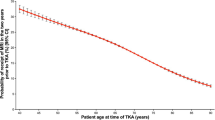Abstract
Objective
Pre-authorization processes are often used by medical insurance companies to reduce costs by managing the utilization of advanced diagnostic imaging, and their impact on patient care is unclear. The purpose of our study is to determine if a pre-authorization process increases the rate of surgically significant abnormal knee MRI and surgical referrals compared with patients referred from pediatric orthopedic specialists who do not undergo a pre-authorization process.
Materials and methods
A retrospective study was performed; 124 patients were identified who were referred for knee MRI by a pediatric orthopedist. The study population included patients who underwent an insurance pre-authorization process and the control group consisted of those who did not. The results of the MRI and whether they were deemed surgically significant, in addition to surgical referral, were recorded and compared.
Results
The study and control groups showed no statistically significant difference in outcome with regard to surgically significant findings on MRI (p = 0.92) or whether the patient required surgery (p = 0.6).
Conclusions
In this population, there is no difference in the likelihood of an abnormal knee MRI demonstrating surgically significant findings or referral to surgery in patients who did and those who did not undergo an insurance pre-authorization process when patients are referred from a pediatric orthopedic specialist. The insurance pre-authorization process does not appear to have an impact on patient diagnosis and treatment and may unnecessarily add bureaucracy and costs.
Similar content being viewed by others
References
Robinson JD, Hippe DS, Hiatt MD. The effect of a no-denial policy on imaging utilization. J Am Coll Radiol. 2013;10(7):501–6.
Morley CP, Badolato DJ, Hickner J, Epling JW. The impact of prior authorization requirements on primary care physicians’ offices: report of two parallel network studies. J Am Board Fam Med. 2013;26(1):93–5.
Schneider J, Pinkard S. Prior authorization and overuse of imaging. Health Aff (Millwood). 2012;31(12):2830. .
ACR–SSR practice parameter for the performance and interpretation of magnetic resonance imaging (MRI) of the knee. http://www.acr.org/~/media/4A4471FCA2B449059EFEB2DAB5421EB4.pdf
Munshi M, Davidson M, MacDonald PB, Froese W, Sutherland K. The efficacy of magnetic resonance imaging in acute knee injuries. Clin J Sport Med. 2000;10(1):34–9.
Kern LM, Wilcox A, Shapiro J, Dhopeshwarkar RV, Kaushal R. Which components of health information technology will drive financial value? Am J Manag Care. 2012;18(8):438–45.http://www.ajmc.com/publications/issue/2012/2012-8-vol18-n8/Which-Components-of-Health-Information-Technology-Will-Drive-Financial-Value#sthash.vms3iNKy.dpuf. http://www.ajmc.com/publications/issue/2012/2012-8-vol18-n8/A-Technology-Solution-for-the-High-Tech-Diagnostic-Imaging-Conundrum/
Author information
Authors and Affiliations
Corresponding author
Ethics declarations
Disclaimers
The opinions expressed in this article belong to the authors alone and not to any institution or source of funding.
Sources of support
This manuscript required no outside support, aside from the time spent by the authors in compiling and analyzing data and preparing this manuscript.
Conflicts of interest
The authors have no relevant financial interests to disclose.
Rights and permissions
About this article
Cite this article
Pierce, D., Kan, J.H., May, M. et al. Pre-authorization processes have no effect on patients undergoing knee MRI in a pediatric setting when evaluated by specialists. Skeletal Radiol 46, 171–175 (2017). https://doi.org/10.1007/s00256-016-2509-1
Received:
Revised:
Accepted:
Published:
Issue Date:
DOI: https://doi.org/10.1007/s00256-016-2509-1




